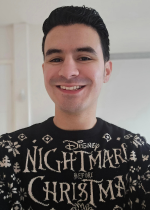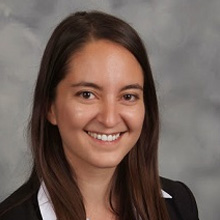What's it like working and studying at CHE?
Why choose the Centre for Health Economics?
A transcription of the video can be found here Why choose the Centre for Health Economics (CHE) Transcript (PDF  , 80kb)
, 80kb)
How does the recruitment process at CHE work?
A transcription of the video can be found here CHE Recruitment Frequently Asked Questions Video Transcript (PDF  , 77kb).
, 77kb).
Hear from our students and staff
The following students and staff spotlights provide a flavour of what it's like to work and study in CHE.
Santiago Palacio Ciro, PhD Student

Wajeeha Raza, PhD Student

I am a second-year PhD student at the Centre for Health Economics (CHE), and my PhD thesis is a cross-disciplinary study on the economic evaluation of interventions for green spaces. Like most PhDs, this involves doing research on the existing literature in the field, enrolling in modules and short courses to learn and build skills, applying this learning to a case study, and writing and presenting the research at various forums. Overall, I’ve found doing a PhD here to be both an enjoyable and uniquely fulfilling experience.
One of the biggest advantages of doing a PhD in CHE is being able to join a community of both incredibly accomplished and extremely supportive health economists. PhD students are generally treated like staff at CHE; so a day at work for me will often include both scheduled and impromptu coffee/lunch chats with different researchers, which have also proven to be very useful for my thesis. This supportive network at CHE also extends beyond work, as I’ve discovered by joining the CHE bouldering/climbing community.
I’ve also really enjoyed the freedom to tailor the research questions for my PhD around my interests and goals. Of course, there are still times when the PhD can feel a bit overwhelming, but on those days, you can always count on the cake/sweets from colleagues' travels or baking adventures to lift your spirits (but only if you’re quick enough!).
Julia Hatamyar, Research Fellow

I feel very lucky to be working with inspiring colleagues at CHE, who push me to grow professionally but also encourage everyone to focus on work-life balance and maintain a flexible mindset. Therefore, I am easily able to work from home if family engagements require – while also enjoying office culture, be that quick catch-ups over coffee, informal brainstorming, or scheduled meetings (both in person and on Zoom).
My workdays generally start early - by choice! Whether in the office or at home, I prefer to begin with a few hours of deep focussed work on health policy evaluation output. This includes, for example, writing machine learning code, evaluating previous analysis with fresh eyes, or writing up the meatier portions of papers and presentation materials. Then I catch up on emails, or if in the office grab another cup of tea and perhaps a quick chat over casual lunch. Afternoons may include meetings with supervisors and co-authors to go over results from the previous week and plan upcoming priorities, or larger team meetings to focus on long term planning.
Every few weeks, I attend CHE’s afternoon seminar presentations from leading UK health economists, and sometimes meet with policymakers from around the world to discuss the needs of global health decision-makers. These discussions help formulate policy impact evaluation ideas specific to the Low- and Middle-Income Countries I study in the Global Health team at CHE, and I often learn about cutting-edge causal inference techniques from our seminar speakers, which directly apply to my work. The days usually end with tasks such as data cleaning, less intensive writing or editing, double-checking any new code, and planning my intensive goals for the following morning. I wrap up with plenty of time to pick up my son from nursery, cook a healthy dinner, and spend the evening with family.
James Gaughan, Research Fellow

I have worked at the Centre for Health Economics (CHE) since 2010. I have always found it to be a supportive and stimulating place to do research. Within the broad research area of policy evaluation, I have worked on several areas, including: variation in costs between hospitals; the relationship between hospital and long-term care; national and local productivity; outcomes from care in emergency departments; and waiting times. Working with different colleagues in these various areas has provided fantastic opportunities to discuss ideas and keep learning. I have never stopped appreciating that everybody’s door is metaphorically open.
I normally split a day into a major activity for the morning and afternoon. These could be developing code for data preparation or analysis; analysing and writing up results; drafting or editing papers. There may also be a project team meeting, a seminar, or another pre-arranged discussion. There will certainly be informal chats in the common room over lunch or in the corridors. So while there are general patterns, every day is different. It’s therefore especially valuable that work is very flexible. I am usually in the office, but always have the option of working from home when needed. This and the emphasis on work-life balance has also allowed me to sustain my passion for music and perform in concerts outside of work, an ideal way to let the mind work on questions in the background and reset.
As is so often the case, the people make a place. CHE is a wonderful place to work at because its people, as well as being highly skilled and knowledgeable, are a pleasure to work with.
David Glynn, Research Fellow

I started my PhD at CHE in 2015 and have been a Research Fellow since 2019. CHE is a great place to work. A typical day for me usually involves a mix of modelling, emails, paper writing and one or two meetings. As a research fellow I have had the opportunity to work on a range of projects which is a great way to gain new technical skills and work with a wide variety of people. CHE tries to match projects to research interests. So far I have had the opportunity to work on projects in: multimorbidity modelling, machine learning, equity and multi-indication treatments.
There are so many people here who are experts in their field and open to helping each other and collaborating. The CHE seminars draw in a range of excellent researchers so are great for keeping up to date with methods and making contacts.
The best thing about working at CHE are the people. There is a very collaborative non-hierarchical ethos. This means that PhD students, professional staff, junior and senior academics all mix together. People come from all over the world to work at CHE which makes for an interesting and inspiring environment.
